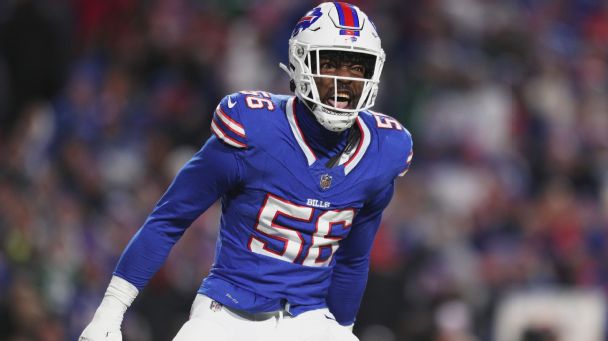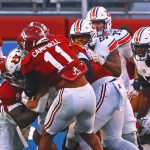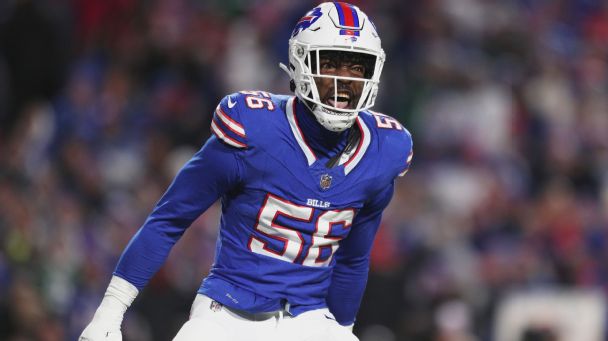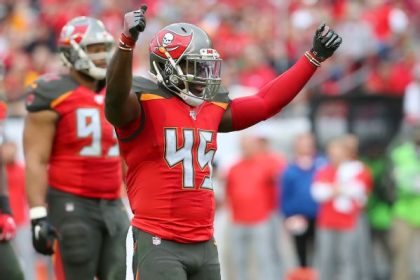
SANTA CLARA, Calif. — In part because they had so many pending free agents and also because they didn’t get the hoped-for return on last season’s investment, the San Francisco 49ers spent the first week of free agency overhauling their defensive line.
In what was easily their biggest D-line makeover since coach Kyle Shanahan and general manager John Lynch arrived in 2017, the Niners agreed to deals with three defensive linemen — ends Leonard Floyd and Yetur Gross-Matos and tackle Jordan Elliott — from the outside, traded for another (tackle Maliek Collins) and re-signed one of their own (Kevin Givens).
Given Shanahan and Lynch’s emphasis on a strong defensive front, the moves shouldn’t have been surprising. But instead of splashing on one big-ticket item, as the 49ers have done in previous free agent cycles, they opted for quantity.
In doing so, San Francisco didn’t just revamp the defensive line. The Niners also rebuilt the middle class of a roster that has become increasingly top heavy in recent years, as none of the added players will make more than $10 million annually.
“You’ve got to trust what John Lynch is doing here when he’s bringing in these guys and the product that’s been put on the field,” Collins said.
While these 49ers have never shied away from making big moves, especially on the defensive front — just last offseason they signed defensive tackle Javon Hargrave to a four-year, $84 million deal — the flurry of moves they’ve made this offseason reflect a necessary philosophical shift.
Even as rumors swirled that the Niners would push their chips into the middle for a top free agent like end Danielle Hunter, the more realistic path for San Francisco to bolster its defensive line was creating cap space via restructuring some bigger contracts, then going shopping in the second tier of free agents.
That’s exactly what the Niners did, restructuring the contracts of Hargrave, tight end George Kittle and linebacker Fred Warner to free up nearly $27 million in cap space, agreeing to a re-worked deal with fullback Kyle Juszczyk to save another $3.98 million. They also made a difficult decision to release defensive tackle Arik Armstead with a post-June 1 designation that will eventually open another $18 million in cap space.
A big chunk of the cap space the Niners created has already been doled out to the defensive line pickups along with additions of players such as linebacker De’Vondre Campbell, quarterback Joshua Dobbs and cornerback Isaac Yiadom and in-house re-signings of players such as guard Jon Feliciano, safety George Odum and quarterback Brandon Allen.
But the Niners’ focal point has been replacing a group — Armstead, Chase Young, Randy Gregory, Clelin Ferrell, Javon Kinlaw and Sebastian Joseph-Day — that accounted for nearly 50% of their defensive line snaps in 2023.
Armstead’s departure hit hardest, as the team and nine-year veteran couldn’t agree to a deal that would allow him to return at a reduced rate. Before his release, Armstead was set to count for more than $28 million against the cap next year. The trio of Gross-Matos, Elliott and Collins combine to count less than half of that ($13.85 million) but also understands that filling Armstead’s shoes is no easy task.
“I don’t think you replace a player like Arik Armstead, the person that he is in the community, the person that he is on the field,” Collins said. “I don’t think you replace that. I’m just here to add my skillset and bring who I am to the table.”
Expected to play opposite star end Nick Bosa, Floyd has 39.5 sacks over the past four seasons and, perhaps most important, has played 108 consecutive games.
In other words, Floyd should the best, most consistently available complement to Bosa since he arrived in 2019. For Floyd, joining the Niners was an easy decision because of their track record of success and how quickly and aggressively they moved to sign him when free agency opened.
“I knew this was a team that was ready for a Super Bowl run,” Floyd said. “I didn’t want to go to a team and not be in a position to not be able to play in the playoffs or win a championship, so I came here with the aspirations of coming in, helping the defense out, winning games and getting back to the big game.”
As for Gross-Matos, the Niners hope the 26-year-old can step into the versatile role that players such as Arden Key and Charles Omenihu have filled in recent years — lining up on the edge in the run game and kicking inside for pass-rush situations.
Collins is the odds-on favorite to replace Armstead in the starting lineup next to Hargrave and offers pass-rushing punch to mix with Elliott’s run-stopping prowess. Since 2021, Collins ranks sixth among defensive tackles who have played at least 300 snaps with a pass rush win rate of 14%.
Elliott will largely be charged with replacing Kinlaw, who signed with the Jets. Kinlaw was the Niners’ third defensive tackle in 2023, capable of filling in at either spot. Elliott will get the first chance to do that, though his role could be a bit more defined in running situations. He was 12th in the NFL in run stop win rate (40%) last year.
Thanks to these additions, the Niners are likely done making big defensive line moves. While the Niners are always open to improving that unit, they’ve fixed several defensive line holes and could use the rest of free agency to address other needs, perhaps a veteran safety.
What the Niners did in first wave of free agency should allow them to pursue the best players available in the draft at offensive line, receiver and cornerback, all of which are considered deep positions in this draft.
As Collins put it, the hope is that whoever comes in will see the opportunity to help push the Niners over the finish line and into the franchise’s sixth Lombardi Trophy.
“This is a team that was in the Super Bowl last year,” Collins said. “This is the team that was in the Super Bowl in 2019. Just seeing that success and seeing the NFC championships and all that, I just want to come in and help bridge that gap to get us over the hump.”











